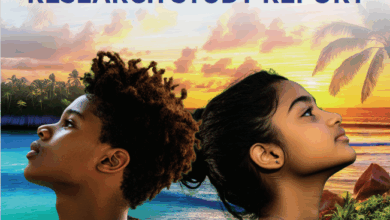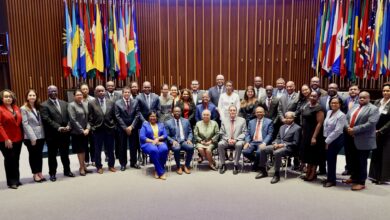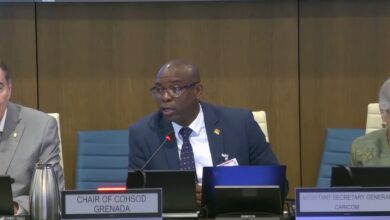Celebrating a triumph of the spirit of regionalism
Today we are gathered in this splendid environment of the National Academy of the Performing Arts in Port of Spain to celebrate an extraordinary achievement, the official launching of the Caribbean Public Health Agency. This is indeed a timely gift to the people of the Caribbean Community which marks its 40th anniversary at the Conference of Heads of Government, beginning tomorrow. I am indeed pleased as CARICOM lead Head for Human Resources, Health and HIV/AIDS to be part of this celebration today and to bring you warm greetings on behalf of my colleague Heads of Government. We all recognize that CARPHA is indeed a triumph of the spirit of regionalism.
This launching is taking place at a time when CARICOM is groping for initiatives that build on the foundations laid down by the Founding fathers – among them, Errol Barrow, Forbes Burnham and Vera Bird – who dared to inspire the re-engagement of a Caribbean Nation out of the ashes of a failed federal experiment. It is taking place at a time when we are seeking to identify landmarks that build on the institutional arrangements so clearly enunciated in the Treaty of Chaguaramus that made bold provisions for knitting the economic, social and political fabric of our individual nation states into a dynamic, competitive and cohesive regional collective. Most of all CARPHA is a fitting response to the challenge of our time to demonstrate that the Caribbean is capable of redefining and redesigning its institutions to better serve the people of the region and at the same time take its place as a Centre of excellence in the international arena This is what we are here to celebrate this afternoon
We have heard from the speakers before me of the evolution, challenges, vision and aspirations of CARPHA. From the perspective of the CARICOM Heads of Government we approved its establishment based on the overwhelming burden of evidence and the recommendations resulting from discussions and debates by our Ministers, and CMOs and other experts that the consolidation of 5 institutions into one Agency was the most feasible option. There were also the lessons from around the world. These included the debates within the World Health Organization on the ideals of health for all and within PAHO on equity in health. The seminal Report of the Caribbean Commission on Health and Development (2007) Chaired by Sir George Alleyne also underscored the need for revamping the Region’s approach to public health and helped to shape the underlying philosophy of CARPHA. In addition the experiences of Canada, UK, USA and the European Union have provided useful guidelines of public health approaches. In the European Union for example, notwithstanding the long established health systems within most of its member states, mechanisms for cooperation in health are being promoted including the European Observatory in Health Systems and Policies, the Association of Schools of Public Health in Europe (ASHER), the European Health Management Association and the European Public Health Alliance. These studies, models and policies decisions notwithstanding, our biggest challenge was coming up with a formula that best fitted the needs and peculiar circumstances of the Caribbean Region.
It is therefore important to place CARPHA in context. The Caribbean Community is no longer an experiment. It is a reality. It was constructed on the basis of a treaty – The Treaty of Chaguaramus in 1973. This Treaty has evolved through amendments over the past 40 years. While the establishment of the Caribbean Single Market and Economy is the acknowledged flagship of the integration movement, it is not the only yard stick by which to measure the progress made in regional integration. The Treaty of Chaguaramus identified three pillars of integration including trade and economic integration, foreign policy and community relations and functional cooperation. More recently a fourth pillar, crime and security has been added. Indeed it must be recognized that long before trade and economic integration component took root, it was in the areas of health, education and culture that the Caribbean Community made its greatest impact. The activities in these areas, singly and collectively, continue to connect the Caribbean people, including the Caribbean Diaspora and to project distinctiveness about the Caribbean in the global arena. In particular in the area of health, cooperation has been an outstanding illustration of what can be gained by acting collectively to achieve outcomes that benefit all citizens across the region, minimizing the inequities and maximizing the efficiencies. There is no better modality in principle than Caribbean Cooperation in Health (CCH). The challenges with the CCH, identified in the various studies, have to do with a failure to implement its priorities due to a lack of a consolidated system and in many cases because of a lack of resources
The Caribbean Public Health Agency is conceived as a response and a remedy to this situation. It is seen as an example of functional cooperation: as a mechanism by which the health of the people of the Caribbean will be promoted and protected from disease, injury and disability, thereby fostering the wellness revolution enunciated in the Port of Spain declaration (2007) unifying to fight the non-communicable diseases l. It is also intended to advance the realization, embodied in the Nassau Declaration (2001): the Health of the Region is the Wealth of the Region. In this regard it is expected to highlight the opportunity costs of pursuing public health functions in a consolidated way rather than as disparate entities that duplicate efforts and dilute the public health objectives for which they were designed. This is by no means to suggest that our existing public health institutions that are now embodied in CARPHA did not serve the region well. In many cases they have functioned under circumstances that challenged the creative imagination and management capability of the Directors of the respective institutions over the years. And I take this opportunity to pay tribute to Dr. Beryl Irons, (CAREC), Ms. Patricia Aquing (CEHI), Dr. Donald Simeon (CHRC), Dr. Fitzroy Henry, (CFNI) and Dr. Lucite Cargill (CRDTL) for their leadership and for their roles in fostering CARPHA.
As we move forward with the implementation of CARPHA, I am pleased to note the vision of the Executive Director, Dr. James Hospedales for promoting centres of innovation in its business plan and highlighting its laboratory and surveillance functions, quality control and drug regulations, research and environmental health. The alignment of CARPHA’s business with the tourism sector, climate change and training public health leadership is a further demonstration of the creative culture that is being nurtured. Its mode of operation is indeed consistent with the notion of the vital contribution of health to economic and human development. This could only augur well for the future of the region.
I particularly expect CARPHA to build on and promote the scientific work that could help to transform the way health policy is influenced by research, by the strategy for accelerating the infusion of international cooperation, connecting with regional and global health priorities and simultaneously stimulating the dynamism of Caribbean public health. These are expectations to be fulfilled
The global stage is ready made for CARPHA especially at this time when there is the fermentation of activity around the post 2015 development agenda. In fashioning CARPHA’s exciting work programme it is essential to recognize that the world is increasingly characterized by massive shifts in wealth and resource flows while inequalities in wealth and access to health are increasing within and across countries. CARPHA must therefore be part of the conversation that articulates for global health in the post 2015 agenda to ensure that increased wealth actually leads to improved health especially among the poor , that health expenditure is recognized as an investment in human wellbeing , increased productivity and national wealth and that attention must be equally paid to the social determinants of health which include lifestyle behaviours
These are the overarching values that would underscore that meaningful results are achieved from the rationalization and harnessing of resources to which CARPHA is committed. In this way CARPHA may yet provide a model of how the Caribbean Community shapes the future of over 25 regional institutions, so that they make a difference in the gamut of services from meteorology, disaster management and, climate change through to quality and standards, examinations council and accreditation to fisheries, agriculture and crime and security. A review of these institutions together with that of the Caribbean Community Secretariat is currently being undertaken as part of a comprehensive plan to increase the effectiveness and efficiency of how the Community does business
The leaders of this Region are quite aware that the global economic crisis has engendered a new economic order and escalated a changed political landscape, with deep structural barriers and access to overseas development assistance (ODA). CARPHA offers an opportunity for the region to revisit its approach to partnership and resource mobilization. I therefore wish to offer profound gratitude to all those development partners that have contributed toward shaping this new landscape of partnership in global health Chief among which are the European Union, the Public Health Agency of Canada, the UK Department of Health, the UK Social Marking Company. We are especially grateful to the Pan American Health Organization that has nurtured the process of transition and continues to collaborate in charting the sustainability of CARPHA and to the CARICOM Secretariat for anchoring the process. No doubt as we move ahead we can expect the consolidation of support from the governments of Brazil and Argentina and many other partners including the World Bank, IDB ,CDC and the Caribbean Development Bank.
I am sure I speak on behalf of my fellow Heads of Government in expressing appreciation to the Government of Trinidad and Tobago for agreeing the host CARPHA and for its role in this official launching of CARPHA on the auspicious occasion of the Region’s 40th anniversary. I wish to commend the Chair and members of the Executive Board, the Chair and members of the Steering Committee, the Interim Director and members of the CARPHA Implementation Team and all those, many of whom are here today, that provided goodwill and support for this noble venture
I feel confident that we are all here today as part of an historic occasion of which we will be duly proud. A prosperous future beckons CARPHA
Rt. Hon. Denzil Douglas
Prime Minister of St. Kitts and Nevis
CARICOM Lead Head of Government for Health, HIV and Human Resources and Chair of the





